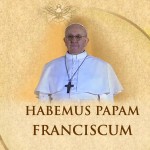The first encyclical by Pope Francis is named LUMEN FIDEI ; the Light of Faith.
 In his exposition, Pope Francis states:
In his exposition, Pope Francis states:
“The light of Faith: this is how the Church’s tradition speaks of the great gift brought by Jesus. In John’s Gospel, Christ says of himself: “I have come as light into the world, that whoever believes in me may not remain in darkness”.
Yet though the sun was born anew each morning, it was clearly incapable of casting its light on all of human existence. The sun does not illumine all reality; its rays cannot penetrate to the shadow of death, the place where men’s eyes are closed to its light. .
Faith was thus understood either as a leap in the dark, to be taken in the absence of light, driven by blind emotion, or as a subjective light, capable perhaps of warming the heart and bringing personal consolation, but not something which could be proposed to others as an objective and shared light which points the way. Slowly but surely, however, it would become evident that the light of autonomous reason is not enough to illumine the future; ultimately the future remains shadowy and fraught with fear of the unknown. As a result, humanity renounced the search for a great light, Truth itself, in order to be content with smaller lights which illumine the fleeting moment yet prove incapable of showing the way. Yet in the absence of light everything becomes confused; it is impossible to tell good from evil, or the road to our destination from other roads which take us in endless circles, going nowhere.
A light to be recovered
There is an urgent need, then, to see once again that faith is a light, for once the flame of faith dies out, all other lights begin to dim. The light of faith is unique, since it is capable of illuminating every aspect of human existence. A light this powerful cannot come from ourselves but from a more primordial source: in a word, it must come from God.”
St. Francis de Sales also spoke of the light of faith.
Here are some instances:
“In holy love, inasmuch as our will is not applied to it by a natural knowledge, but by the light of faith, which assuring us of the infinite goodness that is in God, gives us sufficient cause to love him with all our force. We dig the earth to find gold and silver, employing a present labor for a good which as yet is only hoped for; so that an uncertain knowledge sets us upon a present and certain labor, and as we more discover the vein of the mineral, we search and search more earnestly.”
Our faith is imaged by clouds that obscure complete sight, yet we believe anyway.
“Even a cold scent serves to move the hound to the game, so, dear Theotimus, a knowledge obscure and involved in clouds, like that of faith, most powerfully stirs our affection to love the goodness which it makes us perceive. O how true it is, according to S. Augustine’s exclamation, that the unlearned bear away heaven, while many of the wise are swallowed up in hell!”
That faith leads to love is exampled by his interesting comparison of a blind man and a ploughman who both are aware of light.
“In your opinion, Theotimus, which of the two would love the light more—the one born blind, who might know all the discourses that philosophers make of it and the praises they give it, or the ploughman, who by a clear sight feels and realizes the agreeable splendor of the fair rising sun? The first has more knowledge of it, but the second more fruition, and that fruition produces a love far more lively and affective than a simple knowledge by reasons; for the experience of good makes it infinitely more agreeable than all the science which can be had of it. We begin our love by the knowledge which faith gives us of God’s goodness, which afterwards we relish and taste by love; love whets our taste and our taste heightens our love, so that, as we see the waves, under the stress of winds, roll against one another and swell up, as if contact forced each to strive to outdo the rest, so the taste of good strengthens our love of it, and increases our relish for it, according to that oracle of the divine Wisdom: They that eat me, shall yet hunger: and they that drink me shall yet thirst.”
Source: Treatise on the Love of God, Book 6 Chapter 4